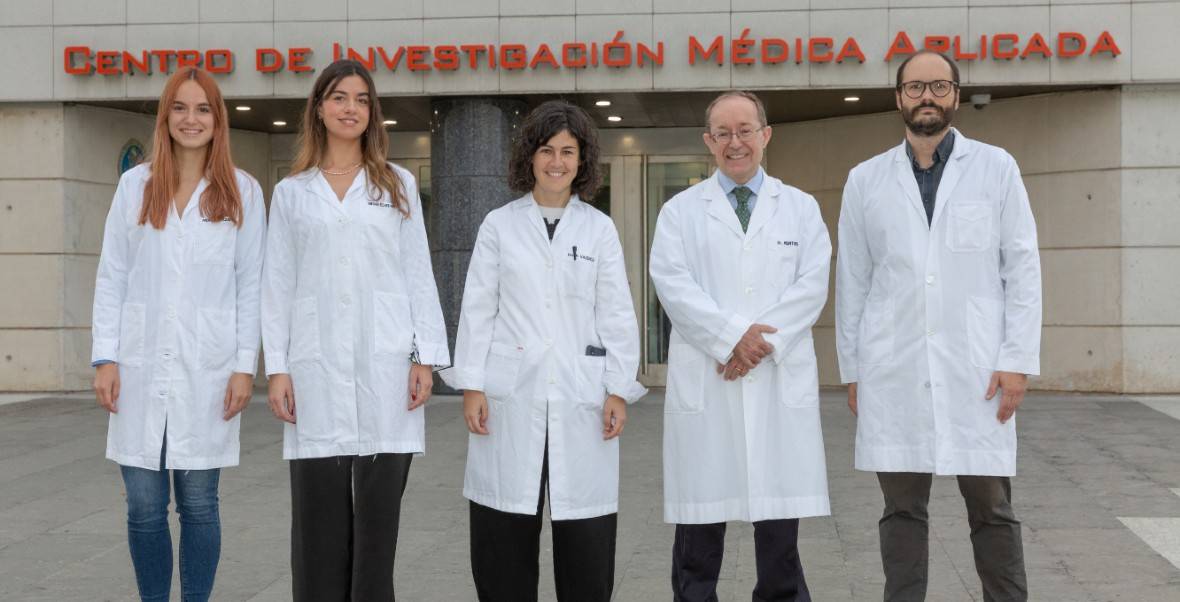Cima Universidad de Navarra researchers find the 'Achilles' heel' of lung cancer
Scientists succeed in making this tumor respond to immunotherapy by inhibiting a type of protein involved in tumor development. This finding would lay the groundwork for a new targeted therapy to treat this disease, the leading cause of cancer-related death worldwide

November 15, 2022
Cima Universidad de Navarra researchers have succeeded in making immunotherapy-resistant lung tumors respond to treatment. Scientists have discovered that this tumor's 'Achilles heel' lies in the inhibition of DSTYK, a type of protein involved in tumor development. This protein is altered in many patients, making it a new therapeutic target for treating this disease, the leading cause of cancer-related death worldwide.
This study recognizes the dependence between the DSTYK protein and lung cancer for the first time. This finding "makes it possible to identify those patients who will not respond to immunotherapy," says Karmele Valencia. Valencia is a researcher in Cima's Solid Tumors Program and the article's first author.
"To prioritize this new target would lay the basis for drug development and innovative clinical trials. In addition, this can expand the percentage of patients who benefit from immunotherapy-based treatments," says Luis Montuenga, a researcher in the Solid Tumors Program at Cima and the study's principal investigator.
The Journal of Experimental Medicine has published this study in its latest issue. Researchers from the Clínica Universidad de Navarra, the University of Navarra, the University of Cologne, and the Vall d'Hebron Institute of Oncology collaborated. In addition, several of the researchers involved in this work belong to the Centro de Investigación Biomédica en Red en Cáncer (CIBERONC) and the Instituto de Investigación Sanitaria de Navarra (IdiSNA).
Collapsing tumor cells and boosting cellular immunity
Lung cancer is the leading cause of cancer-related death in the world. According to the latest Spanish Society of Medical Oncology report, this type of cancer is responsible for 18% of cancer deaths worldwide. In the last decade, lung cancer survival has improved thanks to prevention strategies, early detection, and the improvement of therapeutic strategies based on personalized medicine and immunotherapy. However, there are still patients who do not respond to these therapies.
In recent years, a promising treatment for lung cancer has been proposed that consists of modulating autophagy, "a process by which cells destroy their contents to survive. Autophagy has been shown to play a central role in tumor formation and progression. Moreover, once the tumor is established, autophagy fuels and supports cancer cell growth and contributes to drug resistance by influencing tumor immune evasion," explains Montuenga.
"In our study, we have shown that the DSTYK protein is a central regulator of autophagy. Inhibiting this protein collapses the autophagy process and increases the sensitivity of tumor cells to immune-based therapies. This discovery supports the relevance of this protein as a therapeutic target to advance personalized medicine efforts for lung cancer treatment," explains Valencia.
This work is co-financed by the European Union (European Regional Development Fund, "A way of doing Europe") and has been supported by the Spanish Association Against Cancer, the Ramón Areces Foundation, the Carlos III Health Institute, the Roberto Arnal Planelles Foundation and the International Association for the Study of Lung Cancer (IASLC), among other institutions.